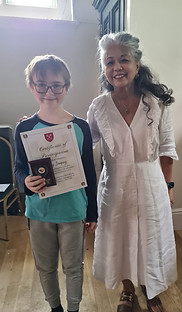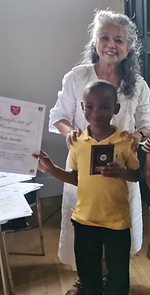
St Peter's Chess Club
Chelsea Chess Tournament - Rapid U8
16 November 2025

.jpeg)
Well done to Rio Rapallini who participated in the Chelsea Chess Tournment and won 6 games out of 6,
and was awarded with a cup for the 1st place.

St Peter's Children Chess Club Tournament - Bedford Park Festival 21 June 2025










Te winners of the first edition of the St Peter's Children Chess Tournament
Under 9
Golden Medal: Rio Rapallini (5 games out 5)
Silver Medal: Sebastian Majerik (3 1/2 out of 5)
Bronze Medal: David Komolafe (3 games out of 5)
Under 11
Golden Medal: Rubin White (5 games out of 5)
Silver Medal: Mohammed Ali Kamran (4 games out 5)
Bronze Medal: Vincent Aylott (3 games out of 5)
Under 12
Gold Medal: Zefiro Petrelli (5 games out 5)
Silver Medal: Alan Bichenko (4 games out 5)
Bronze Medal: Clay Dempsey (3 games out of 5)

(The lessons are held every Tuesday from 4:15 to 5:15pm at St Peter’s, Acton Green)
We started our chess club in October 2021. I have always been passionate about chess and wanted to start a chess club at St Peter’s, and finally did it with 17 children age 7+ who signed up enthusiastically for the club and come every Tuesday to play and learn more about this amazing game of strategy and memory.
It reminds me of the time when I was in Buenos Aires, and asked two grandmasters to help me set up a chess club in the parish of Madre de los Emigrantes. At that time, I wanted to give children the opportunity to build a mindset that could help them when grown-ups to develop new skills and get them out of the street.
Now I have set a new challenge: to help these children to learn how to focus, how to develop a strategic mindset while having fun and playing this amazing game. With the help of Kash, an experienced chess player, we teach the children how to learn the game of chess from scratch.
To get involved please, email stpetersactongreen@gmail.com or call. 020 8994 4281.
Fabrizio Pesce, Chess teacher
24th West London Championships

Well done to Rio, who took part in the 24th West London Chess Championships held at St Joseph Catholic Primary School, 47 Cadogan Street in London on Sunday thwe 15 of June 2025 and won 4 games out 6 and was number 4 in the final players ranking (among 28 players!)
School Chess Team Tournment March 2025


Well Done to David, Luca, Rio, Rubin and Arsene who ended the tournment in the 5th place among 10 schools from West London Championiship and qualified for the National Primary Schools Chess Championship Semi-Finals 2025.



Harrison and Finn

Rio at the Chess tournament

Massi and Theo

Vincent

Massimo P

Massimo Paiser at the 1st Mad Hatter Chess Party in the Chiswick Town Hall on Saturday the 29th of June.
Well done to Massimo who won the third prize at the chess competition.

Well done to Rio Rapallini who won 3 out of 6 and won best dressed and a medal.
West London Chess Tournament - June 2024
Rio won 3 1/2 games out of 6
Theo and Harrison won 3 games out of 6
Massimo won 2 and 1/2 games out 6
Vincent and Finn won 2 games out of 6
Massimiliano and Mateo won 1 and 1/2 game out of 6
Well done!!